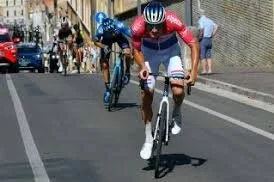Star of Flanders
Stars of Flanders
The Tour of Flanders, considered a form of religious experience to the Flemish-speaking northern Belgians, their high mass of cycling, is so important to the Deceuninck-Quickstep team that they hold a televised media event to announce their rider selection. The team’s World Champion, Julian Alaphilippe, has been asking to ride the race ever since they plucked him away from the French Army team, the one that gave him an out from his humble beginnings, choosing him above all for his cyclocross experience, but for the past six years he’s received a firm “no” from team boss Patrick Levevere; they had Belgians aplenty for the race and the Frenchman was needed for the hilly races, the ones more suited to his build and background.
What a difference the Rainbow Jersey makes for a career. Alaphilippe’s sparkling outing at the Fléche Brabançonne, where he went head to head with Mathieu van der Poel on the steep and cobbled Flander’s type bergs (climbs) beating him for the win, was a confidence builder for both Alaphilippe and his team, and has put him into the status of an outsider for victory at today’s Ronde (van Vlaanderen or Flanders). We’ll all have to see what tactics they adopt, they’re all monsters of the pave on that team, but count on Dries Devenyns to be at the Frenchman’s side the entire day with Kaper Asgreen – who was second at the Ronde two years ago – and Zdenēk Štybar, the Czech cross-man, providing tactical counterpoints for the home team. Alaphilippe has won the Strade Bianche, the Flèche Wallonne, Milano-Sanremo and the World Championships, just to mention his major one-day successes. The power-based Ronde could prove to be beyond what his light build can produce, but watching his attempt will make this race that much more enjoyable for us all.
There aren’t many more flowers we can toss Wout van Aert’s way, the Belgian’s astounding performances these past two years have us all reaching for superlatives and he is accordingly the heavy favorite for today’s race. I do wonder about his ability to handle this stardom, however, and worry that he’s developing that dreaded malady, the one the Belgians term: “dik nek” (spelling perhaps off) or thick neck, what we call a swelled head. There was a moment in a post-Tour race where van Aert’s team was massing at the front and Aussie Michael Matthews, a Tour de France Green Jersey winner it needs to be pointed out, began to move into the line. Van Aert grabbed him by the jersey and threw him off to the side. He wouldn’t have done that to Alaphilippe, I can assure you, the Frenchman would have started a war on the spot and with big Tim Declercq in the house, it would have been over quickly. Van Aert’s petulant complaints about Mathieu van der Poel after the Dutchman’s marking of him at Gent-Wevelgem were unflattering to the Belgian, a situation that van der Poel handled with aplomb. Cycling is the most unfair sport in the world. The stronger you become, the more difficult it is to win as the peloton gathers, like jackals around a lion, combing forces to bring down a stronger prey. We saw this at the Tour when Alaphilippe couldn’t get anyone to work with him in the breakways: they didn’t because he was sure to beat them in the end, so better to neutralize him and let the race unfold in a more advantageous manner. Van Aert needs to realize that he’s the Godzilla of the peloton now, that no one wants to go head-to-head with him. He needs to race accordingly, complaining will get him nowhere.
Wout van Aert has 38 career days of Grand Tour racing in his legs, Julian Alaphilippe over 100 and Mathieu van der Poel a grand total of zero. The Ronde van Vlaanderen is normally run in April, six months after the Vuelta and eight months after the Tour de France, putting everyone on a fairly equal basis. This special year, with the Tour only a bit more than a month behind us, the Tour riders still have that form in their legs, a form that we’ll really see once the Ronde begins to go over 200 kilometers which is when everything changes in a Classic.
Van der Poel looked a bit light against Alaphilippe in the Fléche Brabançonne, a race of 200-kilometers and not 243 like today’s where the level of competition is much, much higher to boot. We’ll get a good idea of whether van der Poel’s choice of staying with his small Alpecin-Fenix team is the right one, a team that garners no invitations whatsoever to the Grand Tours – nor to their build-up events such as the Dauphiné – whether the accumulation of deep racing days by his competition will begin to leave him behind. Cycling fans watch the Giro, the Vuelta and Flanders: the world watches the Tour de France. 25-year of Mathieu van der Poel should be in it the Tour and he won’t be next year either which cheats both himself and cycling. The excitement of a three-week matchup between him and arch-rival van Aert would be riveting plus it would turn him into an even more powerful and versatile racer. Perhaps van der Poel likes life as it is, racing cross, mountain bikes and road races as he wishes. It certainly is an interesting and modern approach to the sport, the sort of versatility we should be developing here in the States. But he should consider the millions that Ineos is certainly putting on the table, consider becoming their Classic’s man, consider what racer he could become with a few Grand Tours in the legs. I believe he owes it to this sport that has given him and his family so much, and to his fans, a base that would expand exponentially with a start in the Tour de France.
